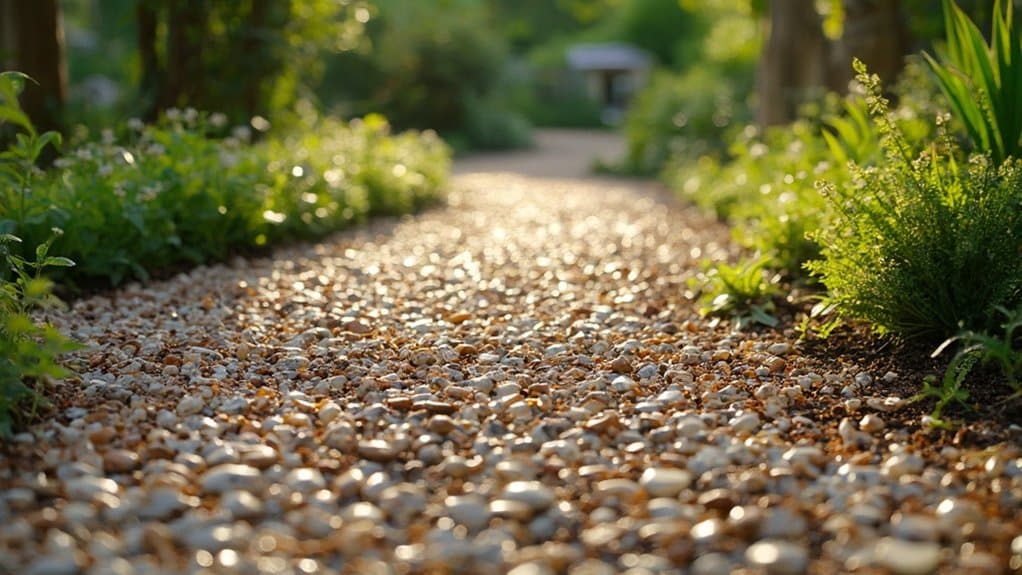Resin-bound gravel offers a smart and lasting solution for British driveways and garden paths. The system mixes natural stone with UV-resistant resin to form a flat, permeable surface that handles our wet weather brilliantly. Much like a good Yorkshire gravel path but without the loose stones, it stays firmly in place whilst letting rainwater drain through.
Choose from classic Cotswold buff to modern slate grey, with countless options to suit your property's character. Dead simple to maintain – just sweep occasionally and pressure wash yearly. Far more practical than loose gravel that spreads everywhere or block paving where weeds pop up between the cracks.
Stands up well to daily car use and won't crack like concrete in the frost. Worth considering if you're after a proper job that'll look smart for years to come.
Key Takeaways
[MODIFIED TEXT]
Resin-bound gravel delivers both smart looks and lasting quality – perfect for UK driveways and paths. Think of mixing and matching colours like Cotswold stone or slate grey to suit your home's style.
The surface naturally handles British weather brilliantly, with rainwater seeping straight through rather than pooling – goodbye puddles and water-logging in your garden.
Its grippy finish means safer walking, even in wet conditions. Particularly reassuring if you've got little ones running about or elderly relatives visiting.
Whilst costlier up front compared to standard gravel or concrete, you'll save money over time. Most installations last 15-25 years with minimal fuss – no more annual touch-ups or replacing loose stones.
Maintenance couldn't be simpler: just sweep weekly and give it an occasional clean with soapy water. No weeding required, unlike traditional gravel drives that need regular attention.
Composition and Core Components of Resin-Bound Gravel
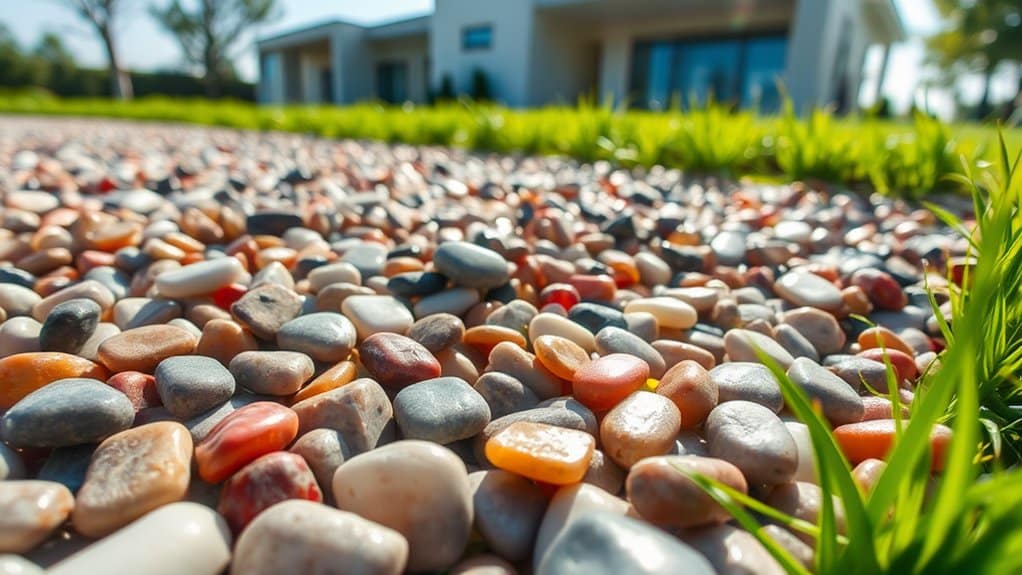
Resin-bound gravel is a robust paving option that merges good looks with practicality. The key lies in choosing the right aggregate – clean, dry stones that match your specific needs. For best results, mix aggregates and resin in a 3:1 ratio by weight.
The resin must be UV-stable and flexible, much like what you'd find in quality garden furniture, making it ideal for British weather conditions. Think of the base like laying a house foundation – it needs to be solid and even for the system to work properly. Proper substrate preparation is essential for longevity, ensuring that the surface withstands various outdoor challenges and can endure the rigors of high-traffic areas.
Temperature affects how quickly the mixture sets, so avoid laying during extreme weather. A mild, dry day (typical British spring or autumn weather) works best.
When done properly, resin-bound gravel creates a surface that's as durable as traditional paving but with better drainage and a more modern look. The end result should handle everything from summer garden parties to winter frost, maintaining its appearance whilst providing reliable, non-slip access.
Aesthetic and Design Options Available
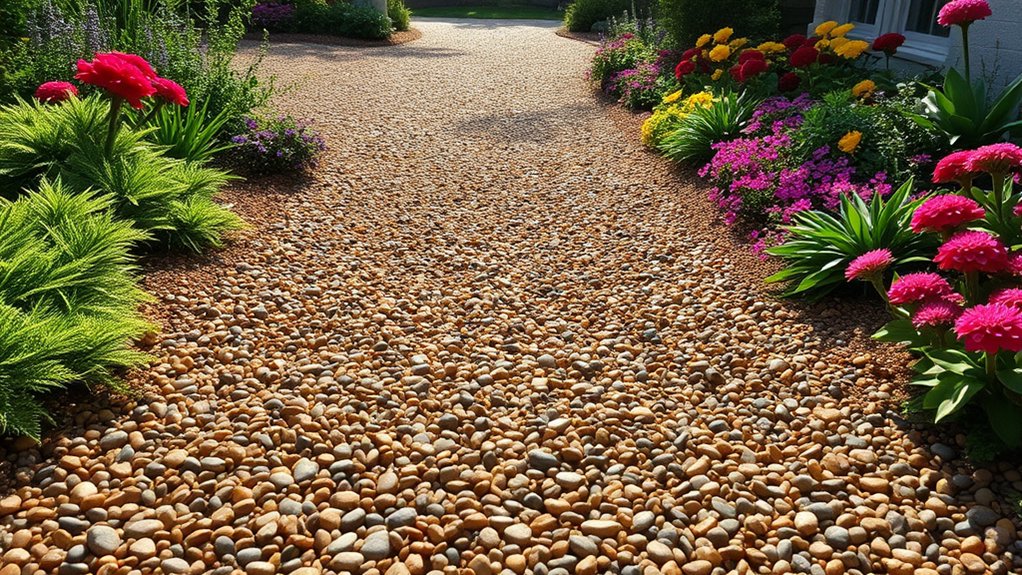
Resin-bound gravel offers vast design flexibility to suit any property. Choose from numerous colours and blend different aggregates to achieve your desired aesthetic. The system works brilliantly for both contemporary and traditional homes, from clean minimalist finishes to warm, natural looks that match British architecture. Additionally, resin bound stone provides durability and low maintenance, making it an ideal choice for homeowners seeking both beauty and practicality. Moreover, frost-resistant aggregates ensure the longevity of your patio even in the challenging UK climate.
Custom Color Choices
Your choice of colour for resin-bound gravel is vast, with over 48 unique blends available. Each shade can set a distinct mood – warm reds create cosiness, whilst modern greys deliver a sleek, contemporary look. Additionally, the DALTEX collection features a variety of aggregates, sizes, and textures for diverse aesthetics. Mixing and customizing colors with proper mixing equipment can help enhance the overall appearance and durability. Mix gold and silver tones for luxury, or opt for natural earthy shades to match your garden. Local suppliers can work with you to create bespoke colour combinations that suit your home's style. Whether you fancy something bold or subtle, there's a perfect blend to make your driveway stand out.
Unique Texture Combinations
Choosing the right gravel texture can transform your garden or driveway. Resin-bound gravel offers practical texture combinations that complement both modern and traditional homes across the UK.
| Texture Type | Design Option |
|---|---|
| Smooth | Contemporary look |
| Coarse | Rustic ambiance |
| Geometric Patterns | Modern elegance |
A smooth finish works brilliantly for contemporary homes and urban spaces, whilst coarse textures suit country cottages and period properties. Geometric patterns add a touch of modern flair, particularly effective for front gardens and paths.
Testing different samples in your outdoor space is crucial – what looks smart in bright sunlight might appear quite different on a typical British rainy day.
Durability and Performance Characteristics
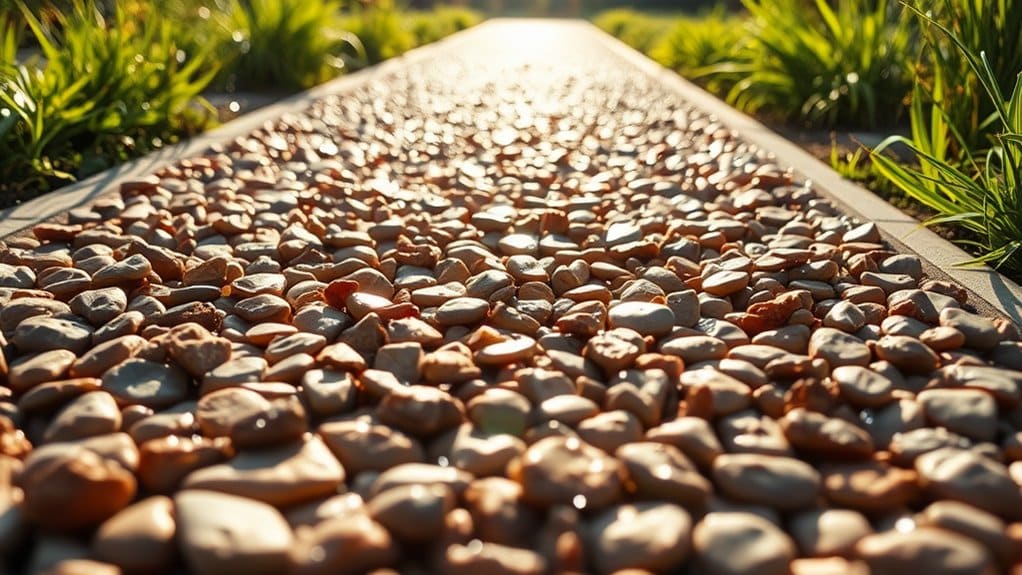
Durability and performance are vital when choosing resin-bound gravel. Different resins offer distinct benefits – epoxy provides strength for busy areas, whilst polyurethane flexes well with Britain's varying temperatures.
Tests show the surface handles heavy vehicles and our harsh weather brilliantly. The porous nature means rainwater drains away naturally, helping prevent puddles and flooding common to UK gardens and driveways.
Unlike traditional gravel or paving, its smooth finish stops weeds coming through, cutting down on garden maintenance. When properly laid using quality materials, you can expect it to last around 25 years – making it a smart investment for your property.
Safety Features and Environmental Benefits

Resin-bound gravel offers both safety and environmental advantages for UK properties.
Its non-slip surface proves particularly useful during Britain's wet weather, whilst its permeable nature helps prevent waterlogging – a common issue in British gardens and driveways.
The surface naturally filters rainwater back into the ground, reducing local flood risks and helping maintain natural drainage patterns.
A practical choice that tackles two key concerns: safety underfoot and proper water management.
Slip Resistance Benefits
Resin-bound gravel offers outstanding grip and safety for outdoor surfaces across the UK.
The material's textured finish provides reliable traction in our often-wet British weather, making it ideal for driveways, paths and public spaces. You can select different aggregate sizes to achieve the right grip level – smaller stones work well for garden paths, whilst larger ones suit steeper driveways.
Once installed, the resin permanently bonds the stones, preventing loose gravel that could cause trips. The surface stays slip-resistant throughout the year, even during frosty mornings when traditional paving becomes treacherous.
For peace of mind in all weather conditions, resin-bound gravel is a smart choice for any outdoor space where safety matters.
Eco-Friendly Drainage Solutions
Safe, permeable surfaces are vital for both public safety and environmental protection. Resin bound gravel offers an effective drainage solution that meets SUDS regulations whilst preventing water pooling. This is particularly relevant for British weather, where frequent rainfall demands reliable drainage systems.
The surface allows rainwater to naturally seep into the ground, reducing local flood risks and helping maintain groundwater levels. Unlike traditional paving, it stops polluted surface water from washing into our streams and rivers.
With minimal upkeep needed and a solid 25-year lifespan, resin bound gravel proves both practical and eco-friendly. It's a sensible choice for UK property owners who want to combine environmental responsibility with attractive outdoor surfaces.
The system works brilliantly for driveways, paths and patios, offering a sustainable option that looks good year-round.
Installation Requirements and Best Practices
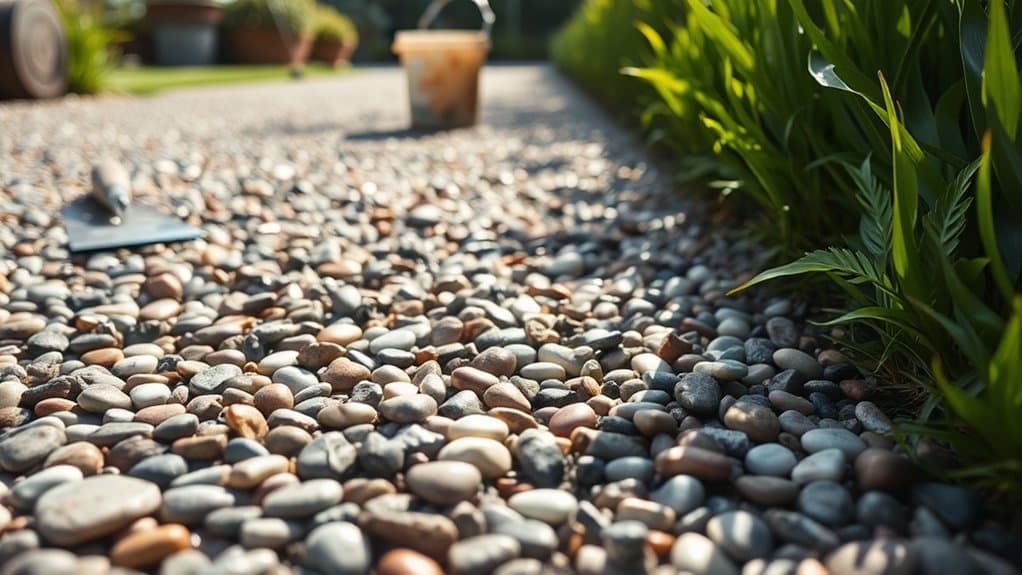
Essential Requirements for Resin-Bound Gravel Installation
Proper preparation and technique ensure a lasting resin-bound gravel surface. These key steps outline the process:
| Preparation Steps | Materials Needed | Best Practices |
|---|---|---|
| Clear existing surface | UV-resistant resin | Maintain consistent mixing |
| Dig to 220mm depth | 2-5mm and 1-3mm stone | Don't over-mix |
| Level ground thoroughly | Forced-action mixer | Apply uniformly |
| Roll until compact | Trowels or rollers | Leave 24 hours to set |
| Check weather is dry | Sealant (optional) | Install safety barriers |
Following these guidelines ensures a proper foundation, much like laying a garden patio. The end result delivers a robust, smart-looking surface that stands up to British weather.
Cost Considerations for Homeowners
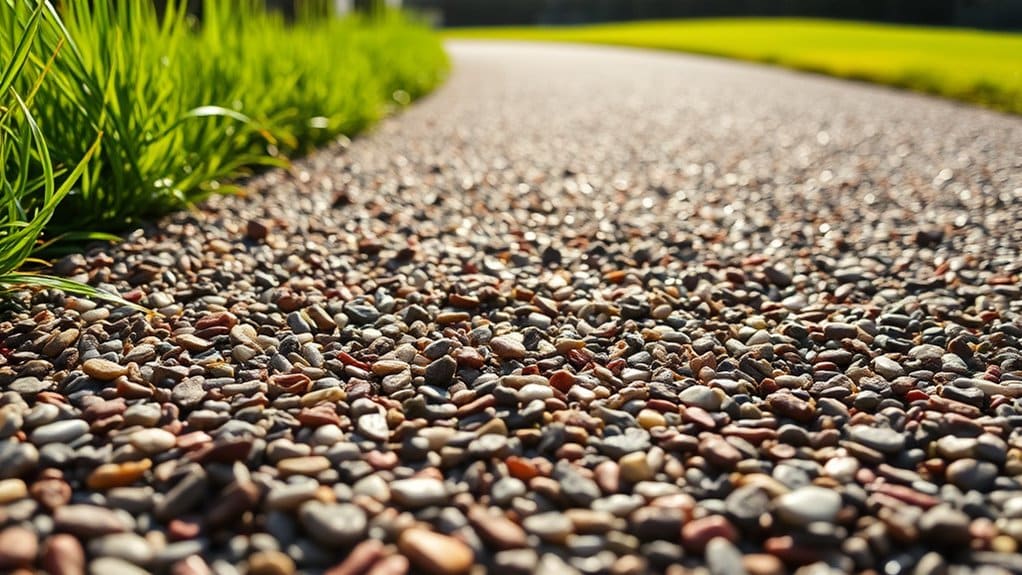
Resin-bound gravel driveways offer both pros and cons for your wallet. The initial outlay tends to be steeper than tarmac or loose gravel – expect to pay £45-60 per square metre fitted.
However, a well-installed resin surface can last 15-20 years with minimal upkeep costs.
Traditional gravel needs regular topping up and often migrates onto lawns or pavements, whilst tarmac can crack and require patching. A resin driveway stays put and resists weeds, saving on annual maintenance expenses that plague cheaper alternatives.
Worth considering:
- Minimal annual cleaning needed (just jet wash)
- No gravel replacement costs
- Resistant to frost damage common in UK winters
- Adds kerb appeal and potential property value
The higher upfront cost typically balances out within 5-7 years through reduced maintenance spending.
For UK homeowners planning to stay put, resin-bound gravel often proves the more economical choice long-term.
Initial Investment Analysis
Resin-bound gravel delivers an attractive, long-lasting surface for your property, though costs need careful consideration. Materials, including the resin binder and aggregate, typically cost more than traditional options. Professional fitting is vital, and choosing the right contractor makes all the difference.
| Cost Factor | Average Cost | Considerations |
|---|---|---|
| Material Costs | ££ | Premium rates for resin and aggregates |
| Installation Fees | £££ | Skilled labour ensures proper finish |
| Base Preparation | ££ | Essential groundwork required |
Your investment's success hinges on quality materials and trusted installers – take time to research both thoroughly.
Long-Term Savings Potential
Resin-bound gravel delivers substantial cost savings over time whilst boosting your property's kerb appeal.
These surfaces typically last 15-25 years, standing up well to daily vehicle use and British weather. The material's natural flexibility prevents common cracking issues, meaning fewer repair bills compared to concrete or tarmac.
Day-to-day care is straightforward – a quick sweep and occasional pressure wash will suffice.
Unlike traditional gravel, the bound surface resists unsightly staining and moss growth, cutting down on maintenance costs. Its permeable nature handles rainwater effectively, which can reduce flooding risks and may lower your home insurance premiums.
For UK homeowners seeking a practical, long-lasting driveway solution, resin-bound gravel offers excellent value for money.
Installation Cost Efficiency
Installing resin-bound gravel offers a cost-effective way to upgrade your driveway. Keep these key points in mind to manage your budget:
- A typical installation takes 15 to 32 hours, depending on your driveway size.
- Skilled tradesmen are worth the investment, as they'll properly mix and lay the surface, avoiding expensive mistakes.
- While premium aggregates cost more upfront, they often prove better value by lasting longer and looking smarter.
Each square metre requires careful preparation and laying, much like fitting a kitchen worktop. Rushing the job simply isn't worth the risk.
Quality materials and proper installation ensure you won't need repairs for years to come.
Maintenance and Care for Resin-Bound Gravel
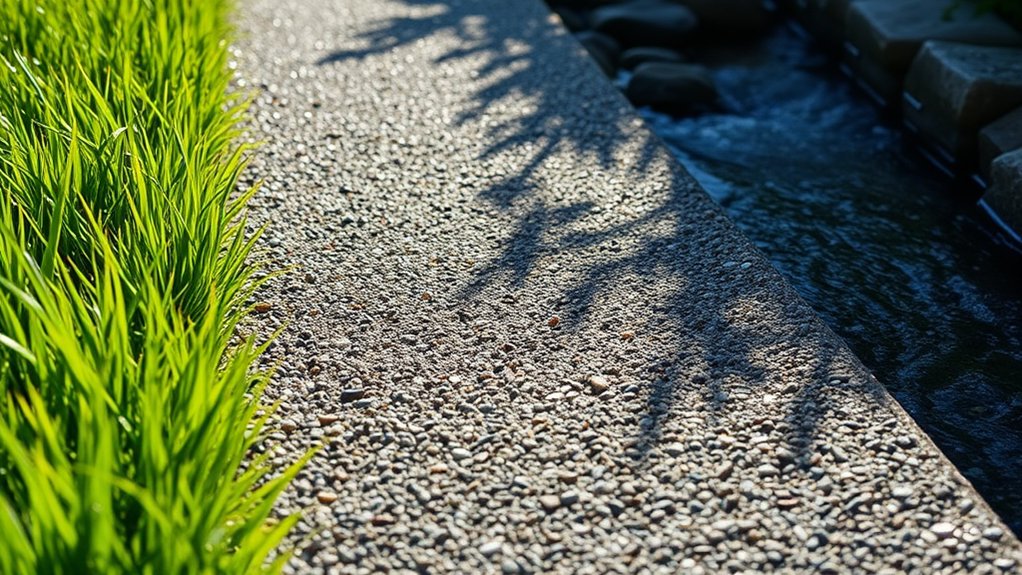
Regular care keeps resin-bound gravel in top condition.
Sweep weekly to clear leaves and debris before they cause stains. Clean thoroughly with mild washing-up liquid and warm water – avoid bleach or harsh cleaners as these damage the surface. A gentle pressure wash works brilliantly to refresh the gravel's appearance.
Check your driveway or path each season. In summer, look for cracks or loose spots.
Come winter, use a plastic snow shovel rather than metal to prevent scratches. Deal with spills straight away, particularly oil or wine. If you spot green patches forming, treat them with an anti-moss solution from your local DIY shop.
These simple maintenance habits will keep your resin-bound surface looking smart whilst protecting your investment.
Customization Options for Unique Looks
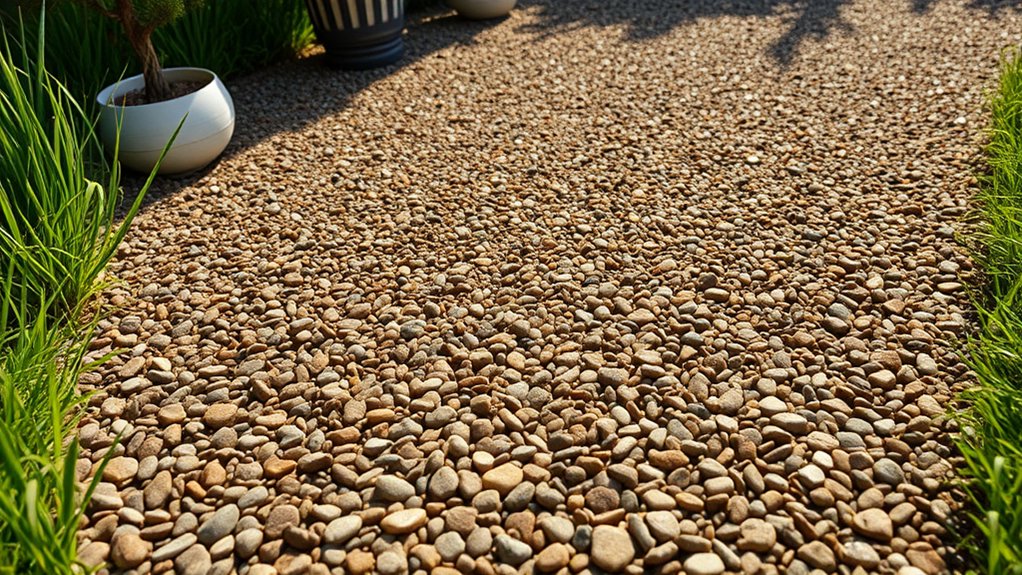
Resin-bound gravel offers endless customisation possibilities for British outdoor spaces.
This versatile material adapts perfectly to both modern and traditional homes across the UK, letting you create a distinctive look that suits your property.
Geometric Patterns
Create striking modern designs with clean lines, hexagons or circular motifs – particularly effective for driveways and garden paths.
Textural Variations
Select finishes ranging from glass-smooth to richly textured, ideal for matching local architectural styles from Cornwall to Scotland.
Bespoke Edging
Define your spaces with complementary borders using brick, stone or metal trim – brilliant for separating garden zones or highlighting feature areas.
The system works brilliantly in our British climate, maintaining its appearance through rain and frost whilst providing excellent drainage – essential for meeting UK planning requirements.
Advantages of Porous Surfaces
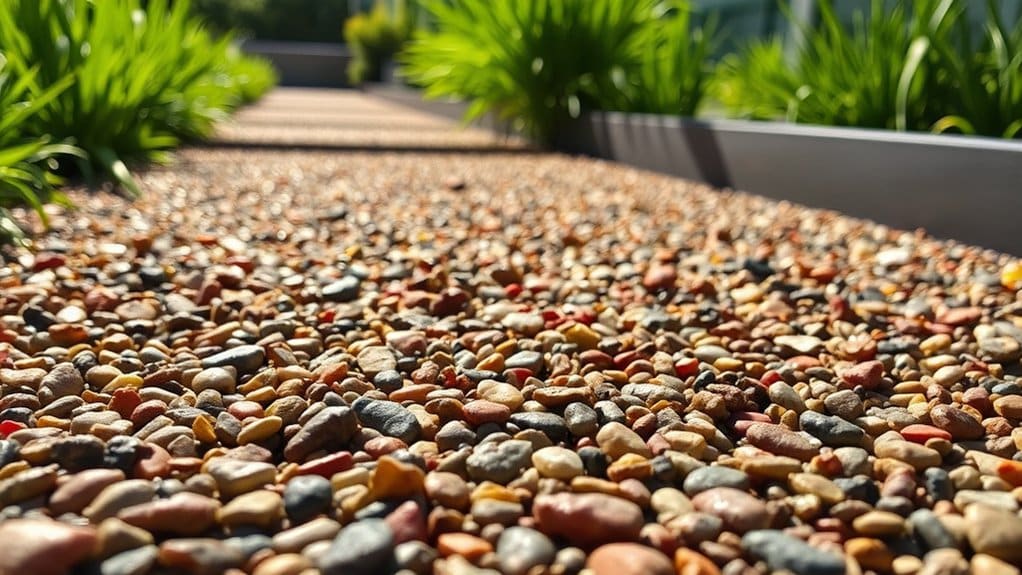
Advantages of Porous Surfaces
As more Britons redesign their outdoor spaces, porous surfaces offer key benefits worth considering. These materials enhance both appearance and drainage, allowing water to soak through naturally. This reduces surface water and helps prevent localised flooding, whilst replenishing groundwater levels.
| Feature | Benefit | Impact |
|---|---|---|
| Infiltration | Reduces flooding | Reduces strain on drainage systems |
| Natural filtration | Improves water quality | Removes contaminants |
| Energy-efficient production | Reduces carbon emissions | Better for environment |
| Supports vegetation | Enables plant growth | Creates attractive gardens |
| Cost-effective maintenance | Cuts long-term costs | Provides value for money |
Porous surfaces, such as permeable paving or gravel, are particularly useful for British gardens and driveways where rainfall is frequent. These practical solutions help manage water whilst creating attractive outdoor spaces.
Weather Resistance and Longevity
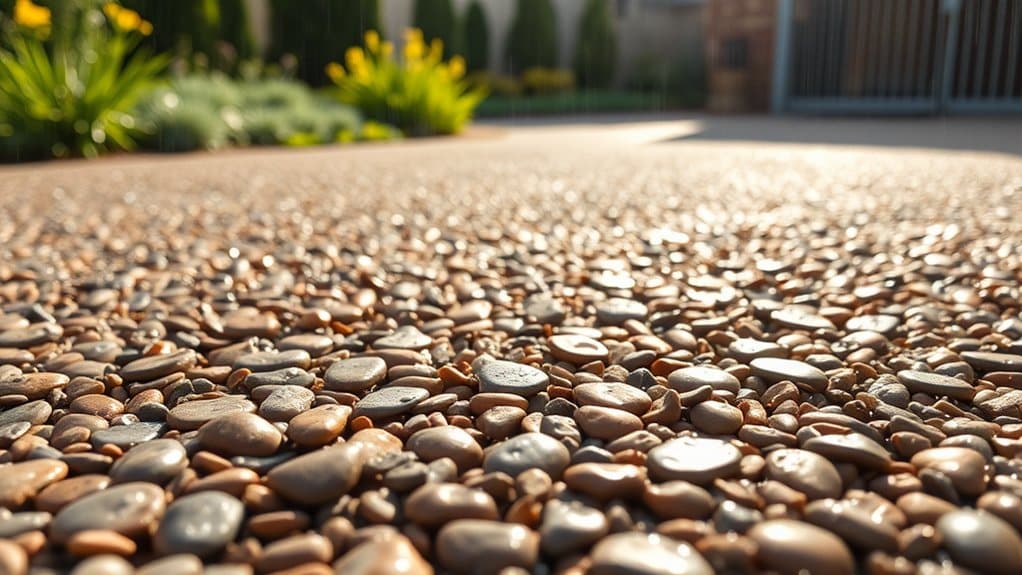
Weather Impact on Resin-Bound Surfaces
The British weather significantly affects how resin-bound gravel performs and lasts. These surfaces are built to cope with our varied climate, from winter frost to summer heat.
Three key weather-resistant features:
- Porous Structure: Handles typical UK rainfall well, preventing water build-up and flooding.
- Tough Build: Stands up to frost, heavy rain and temperature swings common across Britain.
- UV Protection: Quality resin keeps its colour, even in direct sunlight.
Much like a good waterproof coat, resin-bound surfaces protect your driveway or patio year-round, making them a practical choice for British homes.
Enhancing Property Value With Resin-Bound Gravel
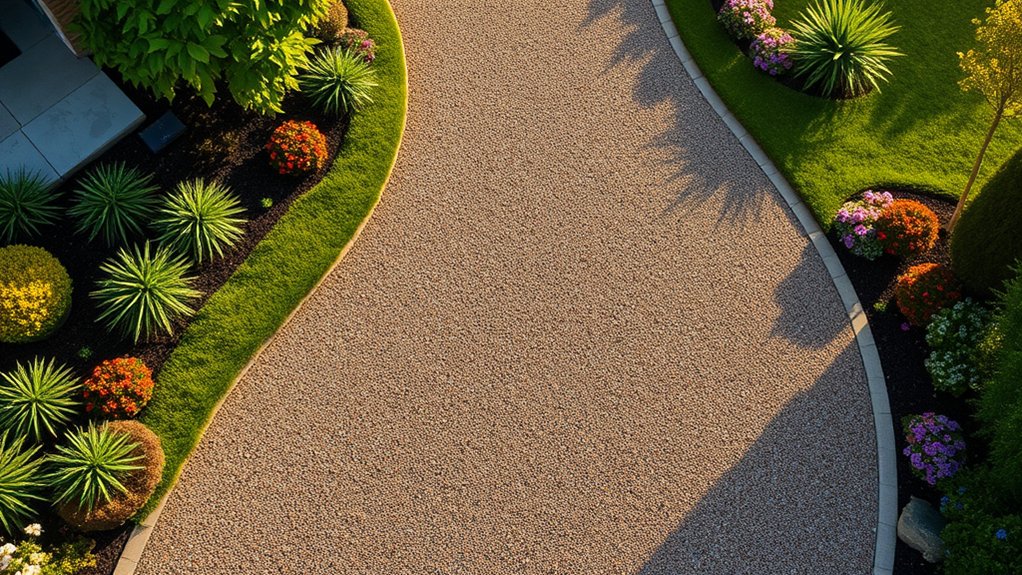
Resin-bound Gravel: A Smart Investment for Your Property
Resin-bound gravel withstands Britain's unpredictable weather whilst adding significant value to your property. Its smart appearance and minimal upkeep requirements make it an attractive feature for house hunters.
| Feature | Benefit | Impact on Value |
|---|---|---|
| Aesthetic Appeal | Modern, customisable designs | Higher kerb appeal |
| Low Maintenance | Minimal upkeep needed | More attractive to buyers |
| Eco-Friendly | Meets SUDS requirements | Appeals to green-minded buyers |
| Enhanced Safety | Non-slip surface | Family-friendly feature |
| Investment Returns | Strong resale value | Better property valuations |
A resin-bound driveway proves itself a worthwhile investment, delivering real returns when it comes time to sell.
Frequently Asked Questions
How Does Resin-Bound Gravel Compare to Traditional Paving Materials?
Resin-bound gravel offers distinct advantages over conventional paving options in the UK market. Whilst the initial cost typically exceeds that of standard block paving or concrete, its minimal maintenance needs and superior longevity make it cost-effective over time. A properly installed resin driveway can last 15-20 years, compared to the 8-10 years you might get from traditional block paving. Think of it like choosing a quality winter coat – pay more upfront for something that lasts, rather than replacing a cheaper option repeatedly.
Can Resin-Bound Gravel Be Repaired if Damaged?
Yes, resin-bound gravel can be repaired through patching, resealing or resurfacing. Small cracks and chips can be fixed with matching resin and aggregate, whilst larger damaged areas might need professional resurfacing. Regular maintenance, including annual sealing and prompt repairs of any damage, helps preserve the surface and extend its lifespan.
Is Resin-Bound Gravel Suitable for DIY Installation?
Resin-bound gravel can be installed as a DIY project, though it requires careful preparation and attention to detail. The key steps involve thoroughly preparing the base surface, accurately measuring and mixing the resin with aggregates, and working swiftly during application. Whilst achievable by competent DIY enthusiasts, first-timers should start with smaller areas like garden paths before tackling larger projects such as driveways.
What Types of Vehicles Are Safe for Resin-Bound Driveways?
Resin-bound driveways easily handle everyday vehicles up to 3.5 tonnes, making them suitable for cars, 4x4s and small commercial vans. Whilst robust, these surfaces aren't designed for heavy goods vehicles or large construction machinery. For optimal longevity, best to restrict usage to standard domestic vehicles.
How Long Does Resin-Bound Gravel Typically Last?
A well-installed resin-bound gravel surface typically lasts 15-25 years, provided you've used quality materials. Regular upkeep, such as sweeping with a stiff brush and occasional pressure washing, helps maintain both durability and appearance. Think of it like caring for your car – the better you look after it, the longer it serves you. Most British driveways with resin-bound gravel easily withstand our varied weather conditions, from summer heat to winter frost.
Conclusion
Choosing resin-bound gravel for your property offers both practical value and kerb appeal. It's a durable surface that complements any British home, from Victorian terraces to modern builds. The permeable surface handles our rainy weather brilliantly, preventing puddles and meeting SUDS requirements. Think of it as a practical investment – much like double glazing or quality insulation – that enhances your property whilst serving a clear purpose. The material allows for various patterns and colours, fitting well with traditional gardens or contemporary layouts.
